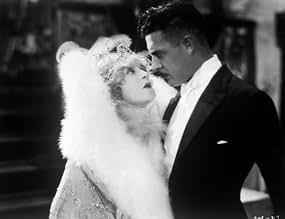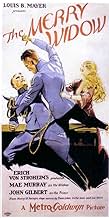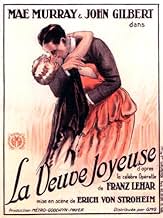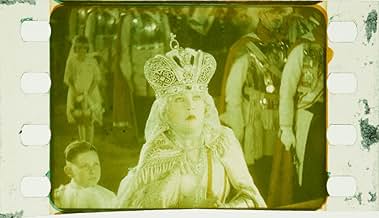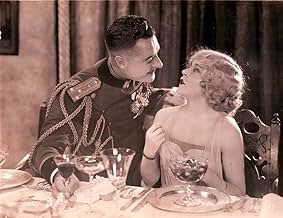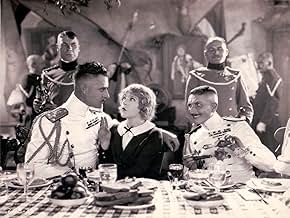VALUTAZIONE IMDb
7,2/10
2685
LA TUA VALUTAZIONE
Aggiungi una trama nella tua linguaA prince must woo the now-wealthy dancer he once abandoned, to keep her money in the country in order to keep it from crashing economically.A prince must woo the now-wealthy dancer he once abandoned, to keep her money in the country in order to keep it from crashing economically.A prince must woo the now-wealthy dancer he once abandoned, to keep her money in the country in order to keep it from crashing economically.
- Regia
- Sceneggiatura
- Star
- Premi
- 3 vittorie totali
Gertrude Bennett
- Hard-Boiled Virginia
- (non citato nei titoli originali)
Bernard Berger
- Boy
- (non citato nei titoli originali)
Sidney Bracey
- Danilo's Footman
- (non citato nei titoli originali)
Estelle Clark
- French Barber
- (non citato nei titoli originali)
Albert Conti
- Danilo's Adjutant
- (non citato nei titoli originali)
D'Arcy Corrigan
- Horatio
- (non citato nei titoli originali)
Joan Crawford
- Ballroom Dancer
- (non citato nei titoli originali)
Xavier Cugat
- Orchestra Leader
- (non citato nei titoli originali)
Anielka Elter
- Blindfolded Musician
- (non citato nei titoli originali)
Dale Fuller
- Sadoja's Chambermaid
- (non citato nei titoli originali)
Clark Gable
- Ballroom Dancer
- (non citato nei titoli originali)
Recensioni in evidenza
A romantic Prince from tiny Monteblanco attempts to woo THE MERRY WIDOW who once loved him when she was a poor dancer.
Erich von Stroheim, the Teutonic genius who marched through Hollywood's Silent Days like a conquering general, had his final directorial stint at MGM Studios producing this lavish & brilliant film based on the operetta by Franz Lehár. The visuals are striking, with sets that look like actual locations--a mountaintop village; the Castellano Cathedral; Maxim's in Paris--and the occasional bizarre touch--the blindfolded musicians sharing the Prince's seduction bed, for example--which von Stroheim relished. The acting is flawless, with no need for dialogue. The actors' faces speak all that need be said.
Mae Murray & John Gilbert portray the passionate lovers whom Fate (and the plot) contrives to keep apart so successfully. Miss Murray (she and the director loathed each other) powerfully portrays a street-wise performer who, through a series of heartbreaks, becomes a vastly wealthy woman. Gilbert expertly plays a prince whose charm has always gotten him his way. Their scenes together, most particularly the waltz sequences, fairly blaze with unrequited sensual longing and desire.
While it is entertaining to wonder what von Stroheim would have done with the role, it is difficult to imagine anyone better than Roy D'Arcy as the simpering, lusting, sneering Crown Prince; he is pure villainy personified and his eventual fate is absolutely justified. Josephine Crowell gives a fine performance as the Queen. Tully Marshall, one of von Stroheim's favorite character actors, adds another portrait to his gallery of grotesques, this time playing a crippled baron with a foot fetish.
The wonderful organ score which accompanies the film was arranged & performed by Dennis James.
MGM would tackle THE MERRY WIDOW again nine years later and produce a vastly different film, this time directed by Ernst Lubitsch and starring Maurice Chevalier & Jeanette MacDonald.
Erich von Stroheim, the Teutonic genius who marched through Hollywood's Silent Days like a conquering general, had his final directorial stint at MGM Studios producing this lavish & brilliant film based on the operetta by Franz Lehár. The visuals are striking, with sets that look like actual locations--a mountaintop village; the Castellano Cathedral; Maxim's in Paris--and the occasional bizarre touch--the blindfolded musicians sharing the Prince's seduction bed, for example--which von Stroheim relished. The acting is flawless, with no need for dialogue. The actors' faces speak all that need be said.
Mae Murray & John Gilbert portray the passionate lovers whom Fate (and the plot) contrives to keep apart so successfully. Miss Murray (she and the director loathed each other) powerfully portrays a street-wise performer who, through a series of heartbreaks, becomes a vastly wealthy woman. Gilbert expertly plays a prince whose charm has always gotten him his way. Their scenes together, most particularly the waltz sequences, fairly blaze with unrequited sensual longing and desire.
While it is entertaining to wonder what von Stroheim would have done with the role, it is difficult to imagine anyone better than Roy D'Arcy as the simpering, lusting, sneering Crown Prince; he is pure villainy personified and his eventual fate is absolutely justified. Josephine Crowell gives a fine performance as the Queen. Tully Marshall, one of von Stroheim's favorite character actors, adds another portrait to his gallery of grotesques, this time playing a crippled baron with a foot fetish.
The wonderful organ score which accompanies the film was arranged & performed by Dennis James.
MGM would tackle THE MERRY WIDOW again nine years later and produce a vastly different film, this time directed by Ernst Lubitsch and starring Maurice Chevalier & Jeanette MacDonald.
It may be a matter of taste but as much as I like and admire Erich Von Stroheim work before and behind the camera, his reputation as a `genius' doesn't seem justified by the films themselves.
Certainly Merry Widow is filmed with great style and the opulent design is certainly diverting. Also the decision to turn the story from light opera to fairly heavy drama is completely in keeping with Von Stroheim 's own rather cynical outlook. But I find his obsessive dwelling on details can make for a slow and even tedious viewing experience, especially in the first half which seems to spend an inordinate amount of time setting the relationship between the dashing, irreverent but humanist Prince Danilo Petrovich (Gilbert - in wonderful form) and the pompous, tight lipped and distinctly perverse Crown Prince Mirko (Roy D'Arcy).with scenes prolonged far longer than their dramatic weight justifies. Also where the film attempts a lighter tone, the effect is of a concrete soufflé, with every glance and double entendre painfully spelt out.
However this is still a satisfying film as a whole, especially in the second half where we finally have some DRAMA. Here in sequence after sequence we finally start to understand Von Stroheim's reputation as he examines the decaying Royal family under a particularly unflattering microscope. The tryst with the blindfolded musicians is a particularly memorable scene.
Having heard of Mae Murray's terrible treatment of the Von and others in her career, I had a tough time warming to her in this, but I have to admit she gives a great performance as Sally O ' Hara, an innocent who's mistreatment at the hands of the family almost ruins her life. Roy D'Arcy makes an indelible impression as the creepy Mirko, his every gesture filling one with disgust.
But for my money it's Gilbert's work that makes this film worthwhile. One of the very finest of silent actors, the expressiveness of his eyes, the tenderness of his playing and bearing throughout make his character completely convincing and his torment over loosing Sally a felt and poignant loss.
Certainly Merry Widow is filmed with great style and the opulent design is certainly diverting. Also the decision to turn the story from light opera to fairly heavy drama is completely in keeping with Von Stroheim 's own rather cynical outlook. But I find his obsessive dwelling on details can make for a slow and even tedious viewing experience, especially in the first half which seems to spend an inordinate amount of time setting the relationship between the dashing, irreverent but humanist Prince Danilo Petrovich (Gilbert - in wonderful form) and the pompous, tight lipped and distinctly perverse Crown Prince Mirko (Roy D'Arcy).with scenes prolonged far longer than their dramatic weight justifies. Also where the film attempts a lighter tone, the effect is of a concrete soufflé, with every glance and double entendre painfully spelt out.
However this is still a satisfying film as a whole, especially in the second half where we finally have some DRAMA. Here in sequence after sequence we finally start to understand Von Stroheim's reputation as he examines the decaying Royal family under a particularly unflattering microscope. The tryst with the blindfolded musicians is a particularly memorable scene.
Having heard of Mae Murray's terrible treatment of the Von and others in her career, I had a tough time warming to her in this, but I have to admit she gives a great performance as Sally O ' Hara, an innocent who's mistreatment at the hands of the family almost ruins her life. Roy D'Arcy makes an indelible impression as the creepy Mirko, his every gesture filling one with disgust.
But for my money it's Gilbert's work that makes this film worthwhile. One of the very finest of silent actors, the expressiveness of his eyes, the tenderness of his playing and bearing throughout make his character completely convincing and his torment over loosing Sally a felt and poignant loss.
Erich von Stroheim has played a neat little trick with 'The Merry Widow'. The first half of the movie plays out like a quirky royal-romance comedy. There are plenty of scenes and gags that could belong to the best comedic works of Howard Hawks. In the second half, the tone changes into more melodramatic, yet the tonal change doesn't take the viewer out of the movie. It actually gives that perfect feel of a mental hangover after the pure love has been ripped into shreds by the cruel world. But the whole film has some sinister undertone - like something is about to happen, but you can't be sure, what it is. Von Stroheim constantly leads his viewers somewhere, allows them to guess, and then - BAM.
John Gilbert is likable as charming Prince Danilo. Mae Murray balances between hammy and sometimes very good performance (someone said, that von Stroheim made actress out from Murray). But Roy D'Arcy is hamming his Crown Prince Mirko up. In a good way. His portrayal of a monocle-wearing sleazy villain blows all previous Erich von Stroheim's performances out of the water.
Like any other von Stroheim's movie, 'The Merry Widow' also suffered from studio interference (some scenes that were cut were quite steamy, probably even for today's standards). I would want to say that 'The Merry Widow' is von Stroheim's weakest work, but again, we can't see his whole vision. The sets are beautiful. Camerawork and editing also something of their own league. Again, you have to admire von Stroheim's attention to small details - lecherous Baron Sadoja's obsession with women's legs, who himself has sick legs.
John Gilbert is likable as charming Prince Danilo. Mae Murray balances between hammy and sometimes very good performance (someone said, that von Stroheim made actress out from Murray). But Roy D'Arcy is hamming his Crown Prince Mirko up. In a good way. His portrayal of a monocle-wearing sleazy villain blows all previous Erich von Stroheim's performances out of the water.
Like any other von Stroheim's movie, 'The Merry Widow' also suffered from studio interference (some scenes that were cut were quite steamy, probably even for today's standards). I would want to say that 'The Merry Widow' is von Stroheim's weakest work, but again, we can't see his whole vision. The sets are beautiful. Camerawork and editing also something of their own league. Again, you have to admire von Stroheim's attention to small details - lecherous Baron Sadoja's obsession with women's legs, who himself has sick legs.
This is Cheshire, reporting from the 2004 Sydney Film Festival, where Erich von Stroheim's Merry Widow was just given a resounding hurrah! It was the darling of the festival! Never have i heard such hooping and cheering. Our enjoyment of the film was no doubt enhanced by the wonderful print and live piano, violin and brass accompaniment we were treated to.
I know Stroheim only went to Hollywood because he wanted to inject a bit of reality into the movies - and i think he did that superbly with Greed and those pictures before it. But the thing i loved most about Foolish Wives, for instance, my favourite Stroheim film so far (keeping in mind i'm yet to see Blind Husbands), was not how natural and real its performances were, though this was incredible, but Stroheim's wickedly subversive sense of humour. Foolish Wives is divine black comedy - and Merry Widow continues that tradition, not Stroheim's dream of realism. I can't believe Stroheim was depressed at how successful this film was, because he abandoned any attempts at "realism" to make it.
I think he achieves something better. I'm not one of these fellows who insists a picture hold a mirror up to reality to be good - if i was interested in reality, i'd watch a documentary, or perhaps sit on a park bench and watch the thing itself! I go to the pictures to see a different world, with a reality all its own. Its why i love the work of Fellini, the Coen Brothers, David Lynch, Wes Anderson, Kubrick and Co. They give us something better than reality! I think that's what Stroheim does here, and despite the fact that he didn't respect what he did, I think its among his greatest achievements. For modern audiences, The Merry Widow is one of the most delightful pieces of black salacious comedy available before the last twenty years (along with Bunuel's priceless L'Age D'Or). Such intelligent, aware humour - we all had a great laugh at the State Theatre in Sydney.
John Gilbert looks marvelous on screen, and MY what a fantastic actor he was. But the show is all but stolen by Roy D'Arcy, as Stroheim's beloved evil cousin figure. His salacious grin is a thing to behold. He cracked the audience up throughout. Seems D'Arcy is a great unsung hero of the cinema, from looking at his credits list. Perhaps a rediscovery of La Boheme and Bardleys the Magnificent might rejuvenate his memory, not to mention a beautiful DVD edition of The Merry Widow... or even a VHS edition! Who are we kidding here, guys! This is not only one of the most enjoyable silent films i've ever seen, its just a darn tootin' good comedy!
For all the talk of the "boundless shots of shoes" i'd heard were in this movie, i was expecting it to be a two-hour long shoe-store commercial. Whoever went on like that about this movie, including Irving Thalberg, must SO not have even heard of foot fettishism. Its so obvious when you see the picture. There are probably six shots of shoes in the picture total (!), and four of them are to illustrate one of the B-characters as a foot fetishist, which is fairly obvious, since he licks his lips and virtually salivates when he looks at feet! This is also ironic for this character, because his feet are the location of his disability: he walks with comic difficulty on two replacement feet, crutches. The remaining shoe shots are part of a delightful scene involving a game of footsies, which i won't spoil for you, but they are most certainly justified by the narrative.
Look, this is the sort of film i'd love to have on a pretty DVD edition (attention Kino!) as part of the wonderful Erich von Stroheim Collection sitting next to my bed so i can watch it to send me off onto a nice sleep. Its the most fun of Stroheim's films, but he in no way sells out, in my opinion. The humour is satirical, subversive "let's see what i can get away with" comedy - a treat!
For the record, i recommend to you in this order:
1. Foolish Wives 2. The Merry Widow (when its released some time soon, or at a film festival near you) 3. Greed 4. The Wedding March 5. Queen Kelly
(the only other surviving Stroheim picture i'm yet to see is Blind Husbands, and he only directed some scenes from Merry-Go-Round, which you can see on the doco The Man You Love to Hate - they're pretty great!)
I know Stroheim only went to Hollywood because he wanted to inject a bit of reality into the movies - and i think he did that superbly with Greed and those pictures before it. But the thing i loved most about Foolish Wives, for instance, my favourite Stroheim film so far (keeping in mind i'm yet to see Blind Husbands), was not how natural and real its performances were, though this was incredible, but Stroheim's wickedly subversive sense of humour. Foolish Wives is divine black comedy - and Merry Widow continues that tradition, not Stroheim's dream of realism. I can't believe Stroheim was depressed at how successful this film was, because he abandoned any attempts at "realism" to make it.
I think he achieves something better. I'm not one of these fellows who insists a picture hold a mirror up to reality to be good - if i was interested in reality, i'd watch a documentary, or perhaps sit on a park bench and watch the thing itself! I go to the pictures to see a different world, with a reality all its own. Its why i love the work of Fellini, the Coen Brothers, David Lynch, Wes Anderson, Kubrick and Co. They give us something better than reality! I think that's what Stroheim does here, and despite the fact that he didn't respect what he did, I think its among his greatest achievements. For modern audiences, The Merry Widow is one of the most delightful pieces of black salacious comedy available before the last twenty years (along with Bunuel's priceless L'Age D'Or). Such intelligent, aware humour - we all had a great laugh at the State Theatre in Sydney.
John Gilbert looks marvelous on screen, and MY what a fantastic actor he was. But the show is all but stolen by Roy D'Arcy, as Stroheim's beloved evil cousin figure. His salacious grin is a thing to behold. He cracked the audience up throughout. Seems D'Arcy is a great unsung hero of the cinema, from looking at his credits list. Perhaps a rediscovery of La Boheme and Bardleys the Magnificent might rejuvenate his memory, not to mention a beautiful DVD edition of The Merry Widow... or even a VHS edition! Who are we kidding here, guys! This is not only one of the most enjoyable silent films i've ever seen, its just a darn tootin' good comedy!
For all the talk of the "boundless shots of shoes" i'd heard were in this movie, i was expecting it to be a two-hour long shoe-store commercial. Whoever went on like that about this movie, including Irving Thalberg, must SO not have even heard of foot fettishism. Its so obvious when you see the picture. There are probably six shots of shoes in the picture total (!), and four of them are to illustrate one of the B-characters as a foot fetishist, which is fairly obvious, since he licks his lips and virtually salivates when he looks at feet! This is also ironic for this character, because his feet are the location of his disability: he walks with comic difficulty on two replacement feet, crutches. The remaining shoe shots are part of a delightful scene involving a game of footsies, which i won't spoil for you, but they are most certainly justified by the narrative.
Look, this is the sort of film i'd love to have on a pretty DVD edition (attention Kino!) as part of the wonderful Erich von Stroheim Collection sitting next to my bed so i can watch it to send me off onto a nice sleep. Its the most fun of Stroheim's films, but he in no way sells out, in my opinion. The humour is satirical, subversive "let's see what i can get away with" comedy - a treat!
For the record, i recommend to you in this order:
1. Foolish Wives 2. The Merry Widow (when its released some time soon, or at a film festival near you) 3. Greed 4. The Wedding March 5. Queen Kelly
(the only other surviving Stroheim picture i'm yet to see is Blind Husbands, and he only directed some scenes from Merry-Go-Round, which you can see on the doco The Man You Love to Hate - they're pretty great!)
This is the kind of silent film that is so enjoyable to watch. Huge budget with a great cast. In the climatic dance sequence, where the "Merry Widow" dances, both Clark Gable and Myrna Loy, both unknowns at the time, were extras.
Lo sapevi?
- QuizWhile filming the climactic ballroom scene, Erich von Stroheim noticed an extra whose costume was not adjusted to his liking. He stepped off the high camera platform on which he was standing, fell, and broke his leg. He directed the rest of the film from a reclining chair while his leg healed.
- BlooperA title card reads "a prince has a duty to his country higher then [sic] his duty to himself" - a grammatical error unusual for such a prestigious studio as MGM.
- Citazioni
Prince Danilo Petrovich: Where the devil did you get these pictures?
Danilo's Adjutant: From my barber--he said he got them in Paris.
- Curiosità sui creditiThe credits state that the film is "personally directed by" Erich von Stroheim.
- Versioni alternativeThe version shown on the Turner Classic Movies (TCM) channel has the musical score arranged by Dennis James and performed by him on a Möller pipe organ. It is shown at a proper silent movie speed and runs 137 minutes.
- ConnessioniEdited into Histoire(s) du cinéma: Seul le cinéma (1994)
I più visti
Accedi per valutare e creare un elenco di titoli salvati per ottenere consigli personalizzati
- How long is The Merry Widow?Powered by Alexa
Dettagli
- Data di uscita
- Paese di origine
- Lingua
- Celebre anche come
- The Merry Widow
- Luoghi delle riprese
- Aziende produttrici
- Vedi altri crediti dell’azienda su IMDbPro
Botteghino
- Budget
- 592.000 USD (previsto)
- Tempo di esecuzione2 ore 17 minuti
- Colore
- Mix di suoni
- Proporzioni
- 1.33 : 1
Contribuisci a questa pagina
Suggerisci una modifica o aggiungi i contenuti mancanti

Divario superiore
By what name was La vedova allegra (1925) officially released in India in English?
Rispondi
